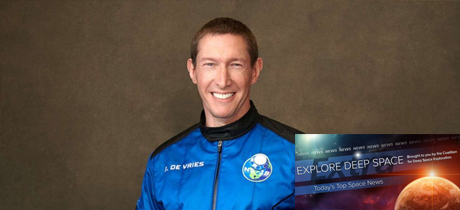In Today’s Deep Space Extra… ISS exposed to space debris again today, according to ROSCOSMOS. Space companies forge alliance to reduce in-orbit debris by 2030. Space industry facing supply chain issues.
Human Space Exploration
Fungi were able to absorb radiation on the ISS. Could astronauts grow their own radiation shields in space?
Universetoday.com (11/11): As human explorers travel beyond Earth orbit, their exposures to solar and cosmic radiation will increase without shielding. An experiment conducted aboard the International Space Station (ISS) suggests that a strain of fungus, Cladosporium sphaerospermum, that thrives on radiation, could provide a source of shielding. Findings have been pre-published in a paper posted on BioRxiv.
ISS to get close to space junk soon, Roscosmos says
TASS of Russia (11/15): The seven astronauts and cosmonauts aboard the International Space Station (ISS) were communicating with ground control teams early Monday over the close approach of space debris. A fragment of China’s Fengyun-1C satellite also flew close to the ISS last week. (Editor’s note: TASS is a Russian government-owned news source).
Chinese crewed Moon landing possible by 2030, says senior space figure
Coalition Member in the News – Northrop Grumman
SpaceNews.com (11/15): Chinese astronauts could be walking on the Moon by 2030, according to Ye Peijian, a senior lunar program designer and engineer, in a Chinese television interview. China and Russia have previously discussed cooperation in the construction of a lunar research station to be staffed during the 2030s.
Space Science
China’s Tianwen 1 Mars orbiter changes orbit to begin planetary survey
Space.com (11/13): Tianwen 1, China’s Mars orbiter, has begun surveying the surface of the Red Planet after serving as a communications relay for the Zhurong rover, which touched down in May. The combination Tianwen 1 orbiter, lander and rover, lifted off on July 23, 2020 and maneuvered into orbit in February 2021 to await deployment of the lander and rover.
Other News
Space companies forge alliance to reduce in-orbit debris by 2030
SpaceNews.com (11/12): Eutelsat, Arianespace, and U.S. based Planet are among 10 companies and organizations that have pledged to reduce the orbital debris population by 2030 under provisions of the Net Zero Space charter, which was launched November 12 during the Paris Peace Forum. According to Arianespace CEO Stephane Israel, the number of operational satellites orbiting the Earth currently, an estimated 4,700, is predicted to increase to 25,000 by the end of the decade.
Space industry feels varying effects of supply chain disruptions
SpaceNews.com (11/14): Panelists during a session of the ASCEND conference by the American Institute of Aeronautics and Astronautics (AIAA) November 10 said that the global supply chain caused by the pandemic highlighted existing weaknesses in traditional space industry supply chains. One panelist remarked that relative to other industries, there’s underinvestment in the space supply chain, which is part of the reason why there are so many challenges.
Glen de Vries, who flew to space with William Shatner, dies in plane crash
UPI (11/12): Glen de Vries, founder of a New York based software healthcare company, was one of four nonprofessionals who launched sub-orbitally on a Blue Origin New Shepard rocket from West Texas on October 13. Among them was actor William Shatner. De Vries died last Thursday in a plane crash in New Jersey. He was 49.
Russia’s Energia patented suborbital tourist spacecraft
TASS of Russia (11/13): Russia’s Energia Rocket and Space Corporation has patented a suborbital spacecraft for flights of space tourists and high-altitude parachute jumps, according to the Federal Industrial Property Institute. (Editor’s note: TASS is a Russian government-owned news source).
Major Space Related Activities for the Week
Major space related activities for the week of November 14-20, 2021
Spacepolicyonline.com (11/14): Among a generous number of space policy related activities slated for this week are the AIAA’s Ascend and a National Academies of Sciences, Engineering and Medicine’s Space Studies Board session. The Washington Space Business Roundtable will host a presentation Wednesday at 12 p.m. EST on the James Webb Space Telescope (JWST), which is undergoing preparations for launch from French Guiana on December 18. Two more virtual JWST briefings are planned by NASA on Thursday at 11 a.m. EST and 2 p.m. EST. The first focuses on the observatory’s science, the second on the JWST’s science instruments. NASA will also host a news briefing on Wednesday at 2 p.m. EST regarding a planned November 30 spacewalk outside the International Space Station (ISS) by astronauts Tom Marshburn and Kayla Barron to replace an external communications antenna. Meanwhile, the U.S. House and Senate continue to deliberate over the roughly $1.75 trillion Build Back Better legislation that has a potential $1.115 billion in funding for NASA. Also, as a break for Thanksgiving approaches, Congress is facing the December 3 expiration of the continuing budget resolution that has prevented a government shutdown since the October 1 start of the 2022 fiscal year.

